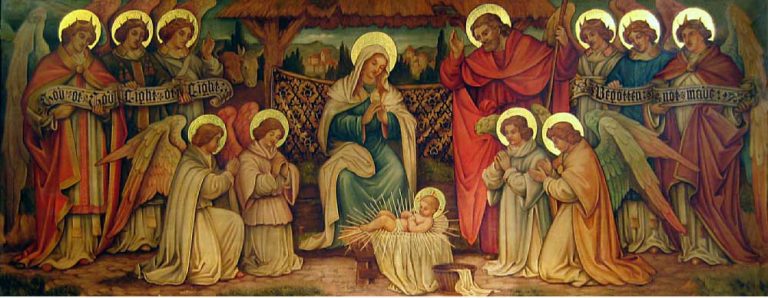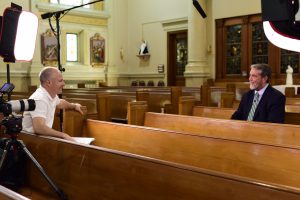By Scott Hahn

The Gospel of Matthew begins with a sentence fragment, perhaps intended as a title: “The book of the genealogy of Jesus Christ, the son of David, the son of Abraham” (Matt 1:1). You may recognize the genealogy from lectors tripping over names like “Ammin’adab” and “Zerub’babel” during Christmas Eve Mass. But this section is more than a list of funny names: it is the interpretive key for the entire New Testament.
The Greek word for “genealogy” is geneseos, which can also mean “beginning” or “origin.” It’s where we get words like “generation” and “genetics” from. It’s also where we get the name for the first book of the Bible: Genesis. And so right off the bat, Matthew is telling his readers, who were familiar with the Jewish Scriptures, that Jesus Christ is a New Beginning not just for the Chosen People but for the entire world.
We call this section of the Scriptures the “New Testament,” but the Greek word for “testament” can also mean “covenant.” So Matthew isn’t just announcing a new revelation from God, but a new covenantal relationship between the Lord and the world He created. In fact, it would be just as accurate—and more meaningful—to call the Gospels, Epistles, and Revelation the “New Covenant.”
Notice that Matthew opens his book about this New Covenant with a list of family ties. The concepts of “covenant” and “family” are intrinsically related; covenant oaths, such as those used for marriages or adoptions, were the means of forging family relationships. In the New Covenant, we are all brought into a family relationship with the Lord. The Catechism of the Catholic Church puts it with characteristic concision: “The Church is nothing other than ‘the family of God’” (CCC 1655).
It is through the Church and her sacraments (which take the form of covenant oaths) that we are brought into a family relationship with the triune God. How fitting, then, that “Christ chose to be born and grow up in the bosom of the holy family of Joseph and Mary” (CCC 1655; emphasis added). The familial nature of our relationship with Christ is modeled by the very circumstances of His earthly life.
Jesus could have burst onto the scene in any number of ways. He could have walked out of the wilderness as a fully-formed adult. He could have been raised in a royal court. He could have descended from heaven amid thunder, lightning, and fireworks. But in His perfect wisdom, He decided it would be most suitable to His nature and ours to be born like any other baby and raised by a carpenter and a common maiden.
We often adore the crèche with the thought, “What humility He showed, to be God and yet to be born into this!” This is a true and good sentiment, but we shouldn’t let ourselves think that Jesus was born into a situation that somehow did not suit Him. The Holy Family—their poverty, their simplicity, their humility—precisely suited Him. It was in this perfect family that He demonstrated the way of living most proper for children of God.
In the same way, then, that the domestic church of the family is the first center of religious practice for young children, the domestic church of the Holy Family was the seed of the Church. We can even say that the Church is an extension of the Holy Family. Through Jesus Christ, Mary and Joseph were the first people to be brought into a family relationship with the Lord. Now, the Church is the universal expression of that family.
When we call fellow Christians “brothers and sisters in Christ,” that’s not a metaphor. We aren’t saying (and shouldn’t be thinking) that our siblings in Christ are only facsimiles of real brothers and sisters, or that we should treat them as if they were our brothers and sisters. No, we Christians truly share an adoptive Father in the Trinitarian God—the God of Abraham and of Moses, the God who took on our humanity in Jesus Christ. We are family—not by the blood of genetic inheritance, but by the blood of Jesus.
Dr. Scott Hahn is president of the St. Paul Center and author of over forty books on theology and biblical studies. His book The First Society: The Sacrament of Matrimony and the Restoration of the Social Order explores how reclaiming marriage as the fundamental unit of society can reorder culture to truth and goodness.
 To learn more about the Holy Family’s important role in leading us to Christ, join Scott Hahn and Matthew Leonard for the upcoming event Wisdom for Our Lenten Journey: The Holy Family and Your Family. Held March 30 at the Castine Center in New Orleans, this event is sure to offer you inspiring wisdom on your journey to Easter. Click here to register.
To learn more about the Holy Family’s important role in leading us to Christ, join Scott Hahn and Matthew Leonard for the upcoming event Wisdom for Our Lenten Journey: The Holy Family and Your Family. Held March 30 at the Castine Center in New Orleans, this event is sure to offer you inspiring wisdom on your journey to Easter. Click here to register.